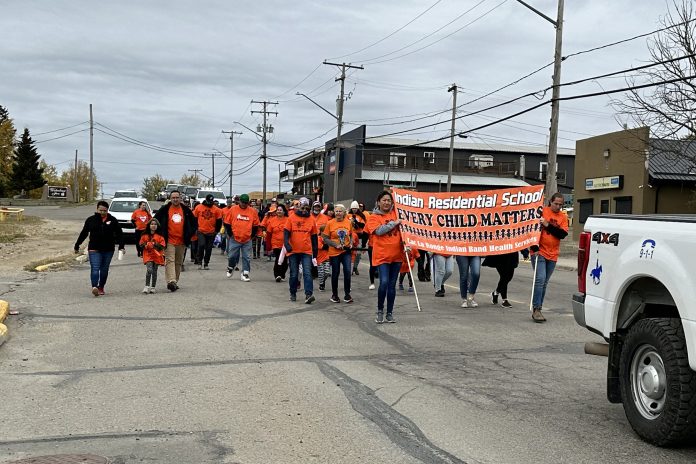
With school just starting for the new year, plans are not quite in place for programming and activities for Sept. 30.
However, there are many ideas and opportunities online through the National Day for Truth and Reconciliation and Orange Shirt Day sites. There is also the National Centre for Truth and Reconciliation, housed at the University of Manitoba, which has the records that are available from the work of the Truth and Reconciliation Commission, which took place between 2009 and 2015.
They have activities and resources advertised for Sept. 30 and Truth and Reconciliation Week Sept. 25 to 30 at ncrt.ca
This reporter registered for five Lunch and Learns sessions during the week. They are free and, having visited the Centre, worth participating in.
The Centre is also offering educational opportunities. Teachers can register their classes to participate between Sept. 25 and 29. They are free Virtual Educational program for Grades 1 through 12. And include Session 1, The Girts Indigenous Peoples Bring to the World; 2: Learning from Survivors; 3: Researching Residential School History; 4: Live Youth Empowerment Event and 5: Reconcili-ACTION.
Enhanced Classroom Engagement is new this year. There is also an invitation to Join Us on Parliament Hill, either in person or by tuning in online for Remembering the Children: National Day for Truth and Reconciliation 2023. More information is available on that at trw@umanitoba.ca
The Canadian Museum for Human Rights in Winnipeg also has information and educational opportunities for Sept. 30 on their Facebook including Help for Survivors.
Perhaps readers would like to share what they did to bring themselves more in touch with Reconciliation on or around Sept. 30? In our October edition, we will share what we found went on throughout the north during that week – Sept. 25 to 30.
More information is available by googling Sept. 30 Canada.
One thing I missed was the establishment of Principles respecting the Government of Canada’s relationship with Indigenous peoples. They consist of 10 Principles:
• 1. The Government of Canada recognizes that all relations with Indigenous peoples need to be based on the recognition and implementation of their right to self-determination, including the inherent right to self-government.
• 2. The government of Canada recognizes that reconciliation is a fundamental purpose of section35 of the Constitution Act, 1982.
• 3. The Government of Canada recognizes that the honour of the Crown guiles the conduct of the Crown in all of the dealings with Indigenous peoples.
• 4. The Government of Canada recognizes that Indigenous self-government is part of Canada’s evolving system of cooperation federalism and distinct orders of government.
• 5. The Government of Canada recognizes that treaties, agreements, and other constructive arrangements between Indigenous peoples and the Crown have been and are intended to be acts of reconciliation based on mutual recognition and respect.
• 6. The Government of Canada recognizes that meaningful engagement with Indigenous peoples aims to secure their free, prior, and informed consent when Canada proposes to take actions which impact them and their rights, including their lands, territories and resources.
• 7. The government of Canada recognizes that respecting and implementing rights is essential and that any infringement of section 35 rights must by law meet a high threshold of justification which includes Indigenous perspectives and satisfies the Crown’s fiduciary obligations.
• 8. The Government of Canada recognizes that reconciliation and self-government require a renewed fiscal relationship, development in collaboration with Indigenous nations, that promotes a mutually supportive climate for economic partnership and resource development.
• 9. The government of Canada recognizes that reconciliation is an ongoing process that occurs in the context of evolving Indigenous-Crown relationships.
• 10. The Government of Canada recognizes that a distinctions-based approach is needed to ensure that the unique rights, interests and circumstances of the First Nations, the Métis nation and Inuit are acknowledged, affirmed and implemented.
I have only just seen these principles, so will explore them in the next month and perhaps we will have some understanding of the Government of Canada’s plan for engagement with Indigenous people once we’ve done some study.
In the meantime, wear orange on Sept. 30.
While Sept. 30 is a statutory holiday in Canada, only federal workers, such as Post Office, federal government and bank staff actually get a paid holiday, with the possible exception of the province of British Columbia.
The Hope for Wellness Help line is available 24 hours a day, seven days a week for counselling and crisis intervention at 1-855-242-3310 or online at hopeforwellness.ca and is connected to the online chat.
Mental Health supports are available for Indigenous people by calling 1-866-925-4419 for referral services and other health supports from the Government of Canada.
The Kikinahk Friendship Centre announced an event for Sept. 30 with headliner Don Burnstick, comedians Stephanie Pangowish and Sherry McKay, along with the Creeland Dancers. More information to follow for times.

